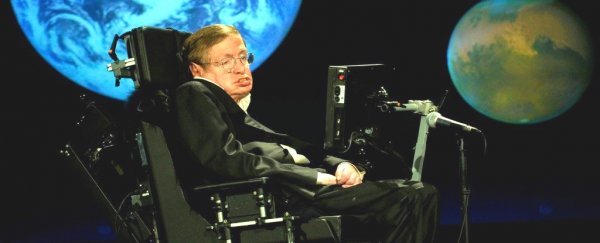It's been several months since the late Stephen Hawking passed away, but posthumous writings by the groundbreaking scientist show the great man still had much more to tell us.
Just days after Hawking's final academic paper was published online, the world-famous physicist is back in the spotlight for a different reason: a stark, controversial prediction of a future that threatens the end of the human race as we know it.
In excerpts from his final book of essays – Brief Answers to the Big Questions, being published this week and billed as his last message to the world – Hawking warns genetic engineering may inevitably alter the trajectory of human evolution.
"We are now entering a new phase of what might be called self-designed evolution, in which we will be able to change and improve our DNA," Hawking writes.
"We have now mapped DNA, which means we have read 'the book of life', so we can start writing in corrections."
In the early stages of these daunting capabilities – enabled by gene-editing technologies like CRISPR – Hawking suggests genetic changes "will be confined to the repair of genetic defects".
In contrast, more comprehensive and absolute tampering with our physiology – such as boosting human intelligence, for example – will take greater time and control to master, since a larger and more complex arrangement of genes will be involved.
Despite the barriers, as the science and technology improves, Hawking predicts a world in which the ability to self-design people ultimately divides society, rather than helping to unite it.
"I am sure that during this century people will discover how to modify both intelligence and instincts such as aggression," he writes.
"Laws will probably be passed against genetic engineering with humans. But some people won't be able to resist the temptation to improve human characteristics, such as size of memory, resistance to disease, and length of life."
The elites who receive this kind of genetic augmentation – which Hawking dubs "superhumans" – may emerge onto a collision course with natural humans, the professor suggests, and the contest could be one that comes to define the very future custodianship of the planet.
"Once such superhumans appear, there are going to be significant political problems with the unimproved humans, who won't be able to compete," he suggests.
"Presumably, they will die out, or become unimportant. Instead, there will be a race of self-designing beings who are improving themselves at an ever-increasing rate."
While Hawking's views on this topic could be considered somewhat alarmist, scientists have been debating the ethics of CRISPR for years, with many sharing fears of how the genetic modifications could lead to things like 'designer babies'.
Amidst the moral panics, it's important to note that some of the concerns do have a historical precedent, and not every advancement suddenly means we're leaving ethical science behind.
But in Hawking's view at least, superhumans are probably not the greatest threat humanity is staring down right now.
As he's discussed before, that dubious honour likely falls to a super-intelligent AI with dangerous capabilities and goals that do not align with those of humans – or some kind of planetary disaster that extinguishes life on Earth before humans have had a chance to jump ship.
You can read more on Hawking's thoughts on these issues at length in Brief Answers to the Big Questions being published this week, or sample some choice excerpts in The Times.
